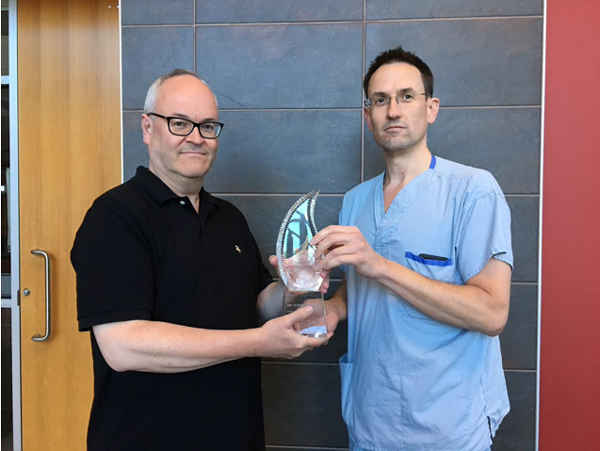|
|

|
  
Top Stories
Update 2019/9/10
Technology
brought to you in part by

CANADIAN RESEARCHERS WORKING TO IMPROVE ORGAN TRANSPLANT TECHNOLOGY
By Gillian Ward
Technological advancement in the way that hearts and lungs are managed in transit between donor and recipient has led to a limited research trial at the University of Alberta Hospital. WaterToday checked in with Alberta Health Services (AHS) to find out more.
The University of Alberta Negative Pressure Ventilation (NVP) Ex Vivo Lung Perfusion trial, underway at the Edmonton transplant centre, was initiated by technology developer, Dr. Darren Freed and his fellow cardio-thoracic transplant surgeon Dr. Jayan Nagendran. According to a spokesperson for AHS, “Health Canada has approved it for up to 12 patients, using perfused lungs that do not meet the standard donor criteria.” The research tests a warm perfusion process for donor organs against the present transplant cold standard, indicating potential for improvement of the transplantation process.
The Transplant Lottery
According to the Organ Procurement and Transplantation Network (OPTN), the odds of recovering viable organs for transplantation are not in favour of the waiting. In North America, just 1 out of 333 deaths occurs in such a way that vital organs can be recovered. Put another way, 99.997% of the time, circumstances are not in favour of the transfer of life from the dying to the hopeful recipient, even where there is a registered donor and family consent. Further complicating the matter is location of the deceased, as many hospitals are not licensed or equipped to manage the organ recovery process.
The condition of organs on arrival to the transplant operating room is a further limiting factor, with up to 80% of donor lungs deemed unacceptable for the operation to go ahead.
Canada Institute for Health Information (CIHI) shows that 349 adults and 8 pediatric patients received lung transplants in Canada in 2018. During that same time, 25 adults passed away waiting.
The number of Canadians expected to need lung transplants is on the rise in Canada.
After decades of decline in the numbers of Canadians smoking, young people have been drawn to e-cigarettes and vaping. CLA published a statement of concern in late August 2019 about e-cigarettes and vaping. The warning echoes concerns of CDC about the negative impact of these novel products on lung health.
With such long odds for hundreds of Canadians on the wait list for a lung transplant, and so few viable organs to go around, the Alberta-based surgeons were motivated to develop a better way to manage donor hearts and lungs in transit to the operating room.
In 2015, Drs. Freed and Nagendran formed Tevosol Inc. to carry out the business of research and development on EVOSS (Ex-viva Organ Support System). The colleagues at University of Alberta hospital recruited a CEO, Ron Mills from Chicago, to oversee the process of getting the prototype to work in the field, beginning with trials to perfect the device and prove the concept.
WaterToday reached Mr. Mills in Edmonton. “We are Innovating in the space between the donor and the recipient”, stated Mills, working to improve the likelihood that recovered organs make the journey all the way to the recipient, in condition to save lives.
The idea of warm perfusion for organs is not new, but the application of technology to closely mimic conditions in the body is the advancement.
Mills describes EVOSS as an artificial thorax, or chest. “We provide for those organs in transport what the body provides naturally, a flow of warm, oxygenated blood and in the case of the lungs, we allow them to breathe, respirate. In the case of the heart, we allow it to pump blood, not just beat, but work. So these are working, functional, living organs on the (EVOSS) machine”.
Speaking of the logistics of matching donor organs with the patients waiting for transplant, Mills says, “There are many things you need to overcome to make that journey, sometimes its distance and time. A better vehicle definitely helps. Right now, outside of the body, on ice is how most organs are transported. Within four or six hours for hearts and lungs, you are starting to push it…it’s a problem because it limits how far you can go to find a matching donor and it severely limits how many chances the recipient has for receiving a good organ.”
“As much as possible, you keep the organ in a functional, natural state,” explains Mills. “The actual, clinical term is “insult” of the cold. If you lack flow through the vessels, or you lack warmth, you are only buying time. When you cool something down, the organ is slowly dying. It’s a rather brutal way to preserve an organ, to refrigerate it. Everything is better if its closer to functional, with all the nutrients it needs, all those good things, maintaining the natural state”, says Mills.
With EVOSS, organs will remain viable for transplant for up to 12 hours, opening the field for movement of donor organs to those in waiting at any transplant centre in Canada.
When the EVOSS unit arrives at the transplant hospital, the medical team is able to evaluate the function of the working organs, offering real time, clinical insight for making the decision to go ahead with the transplant surgery. OPTN states that warm perfusion of the organs to be transplanted may also reduce incidence of post-surgical complications. Tevosol believes their EVOSS unit will influence an increase in the number of organs accepted for transplant, and the success of the operations.
As for the cost of the technology, Mills relates, “We are aware of the economics of transplantation centres. We are founded by surgeons that believe this is a human right for patients.” Though EVOSS prototype was costly to develop, Mills says “we are making a commercial model now, it’s another innovation of ours, making it cheaper; portable and affordable.”
Decisions have not yet been made about where the units will be manufactured, but the process is underway, the company is raising capital, Health Canada and FDA trials and approvals are anticipated in 2020.
For the families of Canadians hoping for a life saving organ transplant, advocacy to raise awareness of the need for more organ donors is vital. Fundraisers to help support families with the cost of living close by the transplant hospital are vital. Advancement of the transplantation process cannot come soon enough. As Canada continues to invest in technology and innovation in restorative medicine, WaterToday will cover it.

Dr. Darren Freed received the 2019 “Angels’ Legacy Project Innovation and Technology Award” for his work developing EVOSS
gillian@watertoday.ca
|
|
|
Have a question? Give us a call 613-501-0175
All rights reserved 2026 - WATERTODAY - This material may not be reproduced in whole or in part and may not be distributed,
publicly performed, proxy cached or otherwise used, except with express permission.
|
| |